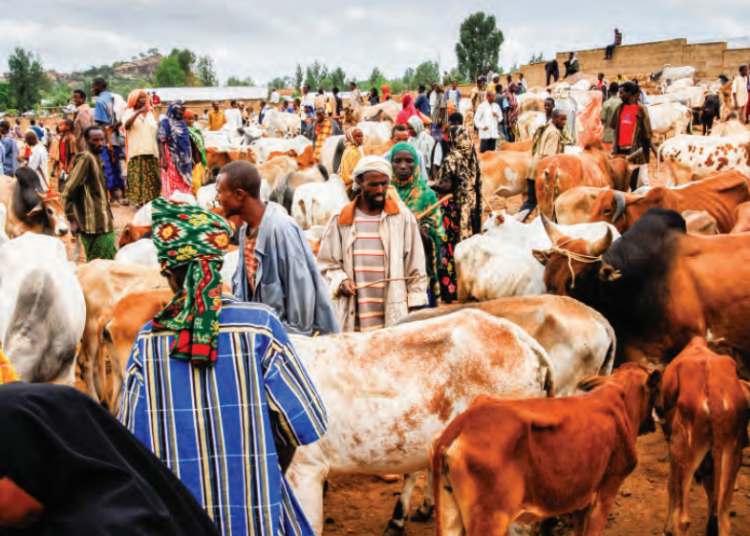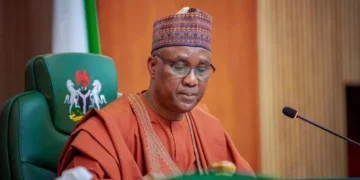President Bola Ahmed Tinubu has started a reform of the livestock industry to increase its contribution to the nation’s economy.
This comes barely a day after the Ministry for Livestock Development announcement.
The president stated that the long-term neglect of the livestock sector had weighed heavily on the country’s import bills, with milk and dairy products accounting for $1.2 billion to $1.5 billion.
The president, who opened a two-day Consultative Workshop on Livestock Reforms on Thursday at the State House Conference Centre, Abuja, pledged government support in revamping and repositioning the sector to create employment and attract foreign direct investment (FDI).
He reassured the public that past mistakes, such as neglecting livestock farming and relying on dairy imports, would be avoided, as he pledged his commitment to engendering a robust framework to stimulate prosperity in the sector.
“The livestock sector is critical, and we will give all it needs to bring value to our country. Stakeholders, I assure you that you will not regret the collaboration and investment in this sector.
“It is about time that we did it right. A country of over 200 million people and we cannot serve our children one pint of milk in a classroom per day? That is not right.
“We didn’t see the investment opportunities. We didn’t see the economy of livestock in the past. Now that we have seen it, we must work together to restart the sector,’’ he said.
President Tinubu, in a statement by his spokesman, Bayo Onanuga, commended the Presidential Livestock Reform Implementation Committee, led by the co-chairman, Prof. Attahiru Jega, and secretary, Prof Muhammed Yahaya Kuta, for their commitment to repositioning the livestock sector.
“Our shared mission is clear: we aim to transform the livestock sector from its current subsistence model into a thriving, commercialised industry, an industry that significantly contributes to Nigeria’s Gross Domestic Product and provides decent jobs and sustainable livelihoods for our growing population.
“The potential is immense: With 563 million chickens, 58 million cattle, 124 million goats, 60 million sheep, and 16 million pigs, Nigeria is the leading livestock producer in West Africa. Yet, despite this vast resource, we face stark realities.
“Our annual production of animal-source foods, like milk at 0.7 billion litres, meat at 1.48 million tonnes and eggs at 0.69 million metric tonnes, falls far short of our needs. Our per capita consumption levels—8.7 litres of milk, 9 kg of meat, 3.5kg or 45 eggs per year—are troublingly low compared to global averages. These are 44 litres of milk, 19 kg of meat and between 160 and 180 eggs per year.
“What is more worrisome to me is the average milk yield by cow breeds managed by our pastoralists: it is a mere 0.5 to 1.5 litres per day, compared to a global average of 6.6 litres per day. We can do much better!
“The long-term neglect of the livestock sector has weighed heavily on the country’s import bills, with milk and dairy products accounting for $1.2 to$1.5 billion.”
Tinubu expressed his belief that Nigeria can achieve self-sufficiency in the sector.
“Yes, we can do it. We can bring prosperity to our people. We can feed our children. From grass, we can achieve grace. We can contribute so much to the Gross Domestic Product (GDP) and provide decent jobs,’’ the president noted.
He also thanked the Nigerian Governors Forum, NGF, chaired by the governor of Kwara State, Abdurrahman Abdulrazaq, for supporting the reform of animal farming in the country.
Tinubu also acknowledged the efforts of the chairman of the All Progressives Congress (APC) Abdullahi Ganduje, national security adviser Nuhu Ribadu, and FCT minister Nyesom Wike for their commitment to realising the dream.
“We can create a vivid picture of the future we want to see; it’s the future of our country, the economic opportunities for our children, and with that effort, we can say God bless Nigeria,’’ he stated.
NGF chairman Abdulrahman Abdulrazak gave assurance of the “100 per cent buy-in of the subnationals to make the reform a success because it is not just food security, but national security.’’
Abdulrazaq thanked President Tinubu for leading the initiative by chairing the implementation committee, even as he lamented that past efforts in the same direction were reduced to files in the Ministries of Agriculture in states and local councils due to a lack of political will.
He urged states to create a segment for livestock farming and extend the value chain to meat and dairy production.
“If we do not resolve this herdsman issue through this reform, we will continue to have conflicts there. Each state will be urged to create areas for meat and dairy production”, he added.
On his part, the co-chairman of the Livestock Reforms Committee, Prof. Attahiru Jega, said the workshop was convened to obtain additional input to the reform process and buy-in from a range of critical stakeholders drawn from the Nigerian livestock value chain and ecosystem.
“We hope that engagement with critical stakeholders will be a continuous process, as all hands need to be on deck to ensure a well-considered reform process and its seamless and successful implementation,” Prof Jega said, adding that 350 selected critical stakeholders were invited to the workshop.
Minister of Agriculture and Food Security Abubakar Kyari thanked the president for his “bold action, exemplary leadership and unparalleled commitment to livestock reform.’’
Kyari assured of working with the Ministry of Livestock Development to realise the president’s vision to diversify the economy and empower more Nigerians.











